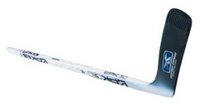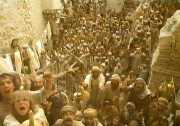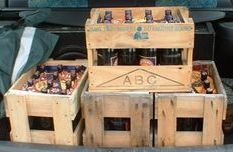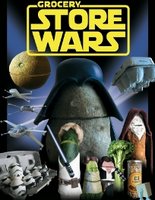HOLY HOCKEY STICK BATMAN!
This week I have had the pleasure of attending the Climate Change and Governance Conference here in Wellington. As the organisers said, it was a unique event for New Zealand as it was the first held in a setting where human induced climate change was accepted as fact. I was however reminded of my letter to the editor of North & South - published only last November - where I had a crack at them for publishing a pre-election climate policy commentary from one Augie Auer. Auer - a meteorologist writing as a "climate expert" - started with "... first of all the Earth is not warming catastrophically." Auer then proceeded to justify his stance with a discussion of Kiwi weather. No word of climbing temperature and CO2 levels - no mention of the famous hockey stick shaped graph curve. And thats all I'll say right now about the media and environmental issues...
I was however reminded of my letter to the editor of North & South - published only last November - where I had a crack at them for publishing a pre-election climate policy commentary from one Augie Auer. Auer - a meteorologist writing as a "climate expert" - started with "... first of all the Earth is not warming catastrophically." Auer then proceeded to justify his stance with a discussion of Kiwi weather. No word of climbing temperature and CO2 levels - no mention of the famous hockey stick shaped graph curve. And thats all I'll say right now about the media and environmental issues...
Anyhow, the conference had many an impressive speaker that collectively provided a timely reminder that our Government needs to provide clear policy direction. NZ business relies on strong policy in order to make investment decision, and ultimately policy will impact us as consumers as we are at the heart of our economy. I thought a key point made was the recommendation to establish a multi-party process to set policy. It's an obvious step with a good chance of producing policy to break through the political cat fighting that presently has us in no-mans-land. Our MMP setting means that policy established cross-party is a must.
The conference has come at a time when questions of climate change are in the news. Cyclone Larry, Westport water shortages, Matata cleanup, and the current Time Magazine. If you are still in doubt whether human induced climate change is real, just ask anyone from the insurance industry. Climate scientists call it mitigation, we lay-people can simply see it as "how can we make a difference". ShoppingFix will provide a tool to make simple everyday decisions that contribute to emissions reductions. Supporting businesses that are energy efficient, that avoid intensive resource use where possible, and that treat the earth with the respect it deserves. Government has been unable to provide a setting for business to create tools, but ShoppingFix is happy to step in. In thinking about what we can do, I'm reminded of a scene from The Life of Brian (yes, the best film ever made). A rather satisfied Brian addresses the people from his balcony: "You've got to think for yourselves, you're all individuals!"
Climate scientists call it mitigation, we lay-people can simply see it as "how can we make a difference". ShoppingFix will provide a tool to make simple everyday decisions that contribute to emissions reductions. Supporting businesses that are energy efficient, that avoid intensive resource use where possible, and that treat the earth with the respect it deserves. Government has been unable to provide a setting for business to create tools, but ShoppingFix is happy to step in. In thinking about what we can do, I'm reminded of a scene from The Life of Brian (yes, the best film ever made). A rather satisfied Brian addresses the people from his balcony: "You've got to think for yourselves, you're all individuals!"
A valuable post conference event was a film and discussion evening at Paramount Theatre. 500 Wellingtonians showed up, paid their $10 and bounced comments and questions off David Vaughan who sits on the IPCC. If you're in ChCh tonight I urge you to go and listen to Lord Ron Oxburgh (ex Chair of Shell) at the Town Hall 7.30pm (its free). The Wellington conference, the Paramount event, and the Oxburgh talk are all crucial opportunities for us to get objective climate change information. More information will lead to better individual decisions. If the politicians cant provide leadership, as consumers we certianly can.
Thursday, March 30, 2006
Monday, March 27, 2006
"A CRATE OF THE GREEN STUFF THANKS GUV"
Have the glory days really gone? Back in my late school and early uni years there was an annual event that celebrated a Kiwi icon. Crate day was a bit of blokey boozey fun that many of you will relate to. There is still the odd crate day held around the country, although I'm sure it would be rare to see the same enthusiasm as displayed by some of my buddies "back in the day"... Now binge drinking is not an activity to condone under any circumstance, so the reason I'm writing is that the love of the bottle has a pretty significant environmental pitfall. Until recently I'd enjoy a bitter from a pretty little bottle that came in cardboard. The problem with that is waste. Sure, we can recycle the glass (and the board), but it turns out that the glass doesn't get much further than the landfill. So I've again taken to the "real" bottle. The 745ml variety that comes in a crate you can swap at the bottle store.
Now binge drinking is not an activity to condone under any circumstance, so the reason I'm writing is that the love of the bottle has a pretty significant environmental pitfall. Until recently I'd enjoy a bitter from a pretty little bottle that came in cardboard. The problem with that is waste. Sure, we can recycle the glass (and the board), but it turns out that the glass doesn't get much further than the landfill. So I've again taken to the "real" bottle. The 745ml variety that comes in a crate you can swap at the bottle store.
During the early part of 2005 New Zealands major glass recycler reduced the price they pay Councils for the glass they return for processing. The price for cullet (as its called) was dropped from $92 to $10 per tonne. A big reason for this decision was that recycled glass had to compete with the cheap imported bottle glass most bottlers use. Problem: at a return of $10 per tonne it is too costly for Councils to send collected glass to Auckland for recycling. For a while the liquor industry was paying a levy to keep recycling viable, but now that agreement has expired bottles invariably sit in the yard at local landfills waiting for councils and industry find a long term solution.
Clearly then, as consumers "on the bottle", an obvious individual solution is to embrace the crate. However, if you find this concept a little too "Bruce Bayliss", at least ask at your local where the glass you're buying comes from. If they don't know ask them to find out for your next visit. If its imported glass you're supporting the market that created the problem. And when you're out at a bar, order tap beer. Not only is it fresher, its also better for the planet.
So go on, embrace the crate... but always remember what Len Ring had to say...
More about: booze, recycling, sustainable shopping, waste
Posted by
mikeymike
at
7:19 pm
0
comments
![]()
Friday, March 24, 2006
STINK MY RIDE
A car is most likely one of the most expensive thing you'll buy in your life. Assuming of course that you WILL buy a car at some point. And also assuming that you haven't simply cleaned up your old Undie500 entry for civvy use. By now we all know that vehicle emissions are a massive contributor to global warming. In New Zealand the transport sector (dominated by private vehicles) contributes 40% of our CO2 emissions and has increased dramatically since 1990. The average Kiwi car is 11 years old and has got a lot bigger since 1990 - and bigger is certainly not better. So before going shopping for a new car it may help to know whose emissions are lining up to stink your ride.
By now we all know that vehicle emissions are a massive contributor to global warming. In New Zealand the transport sector (dominated by private vehicles) contributes 40% of our CO2 emissions and has increased dramatically since 1990. The average Kiwi car is 11 years old and has got a lot bigger since 1990 - and bigger is certainly not better. So before going shopping for a new car it may help to know whose emissions are lining up to stink your ride.
In the 2006 AA Motoring Excellence Awards Hyundai was the winner in the environmental category. Nice. But Hyundai accounted for less than 5% of new vehicle sales in the year to Feb06. Toyota, Holden, Ford, and Honda make up almost 50% of new car sales (in that order of popularity too).
Unfortunately the only hybrid cars you can buy in NZ are Honda and Toyota. Holden and Ford seem (to me) to be tainted with the motorsport brush - where V8s fly around Mt Panorama chugging out kilo's of carbon to the pleasure of thousands of sweaty ozzie blokes. Ford have some nice words to say about the environment on their website, and link to Ford global's efforts, but a search on the Holden website yields no meaningful results for "efficiency" or "emissions".
Honda won a significant 2005 Business Ethics Award for their package of environmental contributions. Buy any new car from them and they'll even plant native trees in return. In the US its constantly Honda and Toyota at the top of fuel efficiency test results but it has been acknowledged that Honda does better out of the test lab.
In the 2004 Energy Wise Rally Toyota cleaned up in the efficiency and overall categories with their Prius hybrid. The rally showed that although the human element played a part, if you want to guzzle the gas and chug the carbon you're best in a Ford. But right now, both Hyundai and Honda have comprehensive environmental information on their websites, they've been getting the right press, and have picked up recent awards. Big ups to Honda and Hyundai.
Posted by
mikeymike
at
3:49 pm
0
comments
![]()
Monday, March 20, 2006
UPDATE
Well well... ShoppingFix is still incubating. I'm pleased to report that it is a happy little baby. I've sent off a couple more funding proposals and have been going through my usual routine of scouring the net for items of interest. If I ran a to-do list, at the top would be "organise your browser bookmarks folder". Yikes! Just ran the cursor over it. Its very scary in there.
In my web wanderings its become clear that I'm tec-inept. Web-tec specifically. I'm doing some fossicking on open source associated concepts and have constantly run across web development entries - particularly in the fascinating worlds that are OpenBusiness and Creative Commons. I'm able to get a lot of overview info from Wikipedia - but it is just that: overview. The answer is of course to stop leading myself down the garden path and do the first things first.
So in coming entries I'll speak to the solution seeker in you. Which I may be able to do most effectively if I organise my bookmarks folder. Dammit...
More about: ShoppingFix
Posted by
mikeymike
at
10:43 pm
0
comments
![]()
Tuesday, March 14, 2006
DRIVING DOWN THE PRICE
This is a little piece inspired by the earlier entry about cheap suits. That entry - like this one - was inspired by a Guardian article. This time the impact of supermarkets on local retailers is up for discussion.
Although its a 2004 article, the supermarket piece also rubbished customer loyalty programs. Which of course pricked my ears as the loyalty aspect of ShoppingFix will be of more than a little significance. The article laments that establishing supermarkets leads to a "reluctance to buy at the corner shop that starves local economies of life-blood". A Bromley, Greater London survey found that a Tesco planned for the town will result in 24mil quid LESS being spent at high street stores by 2015. And that, my friends, is the point I want to address. I'm lucky on two counts. One, I live in Wellington where there are none of those "modern-under-one-roof" malls. Two, I don't live in Christchurch (although I did grow up there). Christchurch is a big town rife with massive malls. They all include supermarkets. Small retailers have been clobbered - with the central city retail lobby being especially vocal. Northlands Mall (pictured here courtesy of the mall owners website) is case in point. 41,000 sqm of shop space and 1,800 car parks. Enormous. Is this good for the community?
I'm lucky on two counts. One, I live in Wellington where there are none of those "modern-under-one-roof" malls. Two, I don't live in Christchurch (although I did grow up there). Christchurch is a big town rife with massive malls. They all include supermarkets. Small retailers have been clobbered - with the central city retail lobby being especially vocal. Northlands Mall (pictured here courtesy of the mall owners website) is case in point. 41,000 sqm of shop space and 1,800 car parks. Enormous. Is this good for the community?
I know for sure that locally owned business is good for the community. I read somewhere that $1 spent "local" has the equivalent of $2 in local economic benefit. This multiplier effect is not nearly as strong for spending at "non-local" stores. In some industries they call what happens to spending at "non-local" businesses "leakage" - for obvious reason. Large format retail tends away from local ownership. Where large format retail uses local suppliers the relationship is often oppressive (especially in the case of supermarkets). Large format also demands that customers drive to the shop. So not only do the goods and profits travel for miles, you've done so too.
When Labour performed the customary post election haggle, they agreed with the Greens that a "Buy Kiwi Made" campaign be initiated. As pointed out in a DomPost article last week, this makes sense on several counts. Including a natural inclination toward "Buy Kiwi Owned". Although we're yet to see how "Buy Kiwi Made" will eventuate lets not sit on our hands. Making the multiplier effect work in your 'hood means some of the benefits of buying local are your benefits...
More about: business, community, food, sustainable shopping, transport, urbanism
Posted by
mikeymike
at
6:57 pm
0
comments
![]()
Monday, March 06, 2006
DAIRY POOS IN THE NEWS
The dairy industry contributes 15-20% of Kiwi export income. Its clearly big business. Fonterra - the dairy farming co-op is a global leader. But dairy production can have a nasty impact. Much of the degradation of the central north island lakes is due to dairy run-off. When cows pee, they recirculate significant levels of nitrates into the soil - when combined with nitrogen and urea based fertiliser application there is huge potential for damage. We are probably contributing to this process even when we buy a coffee. Although the Dairying and Clean Stream Accord provides guidelines for dairy farm practice we can only be assured of environmental standards when we buy organic milk (and lets not get into issues with homogenised and pasteurised milk...). There are a lot of small organic producers - available at your local organics store, and even some of the big players make it.
We are probably contributing to this process even when we buy a coffee. Although the Dairying and Clean Stream Accord provides guidelines for dairy farm practice we can only be assured of environmental standards when we buy organic milk (and lets not get into issues with homogenised and pasteurised milk...). There are a lot of small organic producers - available at your local organics store, and even some of the big players make it.
But we're here to talk about poos. An article in the weekends Guardian tells the story of Japanese research into producing fuel from cow dung. With the quantity of the stuff our massive dairy industry produces we should be keeping a close watch. It should be possible to separate solid from liquid as the stuff leaves the shed - retaining the solid for fuel and applying the liquid to pasture as usual. Much like the clever folk have in this BBC story.
But I am of course no expert on the issue. So in the meantime its maybe worth switching to organic milk...
More about: food, land use, sustainable shopping
Posted by
mikeymike
at
4:47 pm
0
comments
![]()
Friday, March 03, 2006
THE SOLUTION
Contrary to the approach taken by many large environmental charities, ShoppingFix is about hope, action, and change. Its a no-brainer really. We're more likely to achieve widespread change if the platform is positive. Name and shame tactics do not propose a solution.
Naming and shaming appeals to the reality TV inclination of our lives by promoting a passive "oooh, aaah, look at what she's doing" reaction. Passive reaction will not make the difference we need. The earths finite recourses are being flailed mercilessly by the current "business-as-usual" approach. We need to change the way we consume. Like a couple of initiatives that have come to my attention this week hope to do. You'll love this adaptation of Star Wars for the US Organic Trade Association.
Like a couple of initiatives that have come to my attention this week hope to do. You'll love this adaptation of Star Wars for the US Organic Trade Association.
Right here in Wellington a couple of design inclined peeps have come up with a Kotahi Ao, a grassroots film project that highlights solutions to our environmental plight. ShoppingFix would have been an ideal feature for their film, but we've missed deadline by quite a bit! I'm really looking forward to seeing this film later on in the year.
About the time ShoppingFix goes live. This week we completed a significant funding application to the Ministry for the Environment. If we get that funding we will be meeting you on the streets of Wellington in November this year. If we don't get it we'll just have to be even more clever.
In the mean time have fun, catch the last of the Fringe Festival if you can, and keep thinking about how you consume...
More about: activism, sustainable shopping
Posted by
mikeymike
at
10:42 am
0
comments
![]()


